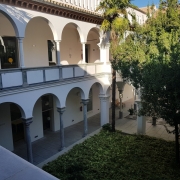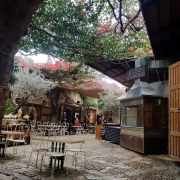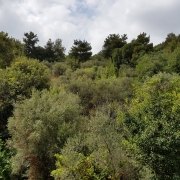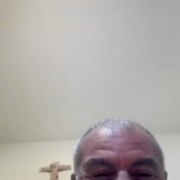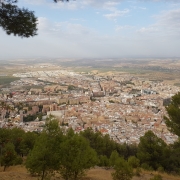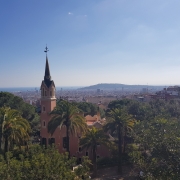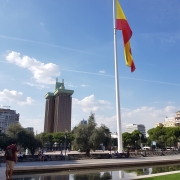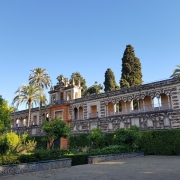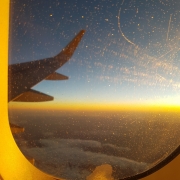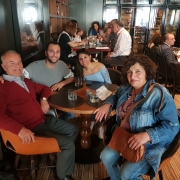Borders. They are meant to protect any community. A tool necessary for the stability and security to be established in any given country. A deterrent for any individual who wants to cause harm for society. By necessity, something called visa was created. Historically, it was given on the border check, the system evolved over time and diverged by countries of origin, leading to different sets of requirements. The ramifications of this system go way beyond the obvious, maybe even fueling the very problem it was meant to resolve. I shall discuss this idea, through my personal experience, being a Lebanese in Europe.
Starting in 2016, I had the ambition to go to Europe and explore new things. Lebanon, being a small – very small – country, had a limited range of opportunities to offer. I decided to go. So, I went. Applied for a foreign university, got accepted, prepared my papers and went. Mind that the bureaucratic part of the process was like trying to convince your mother that you are old enough to go drinking with your friends while being 12 years old. Good luck with that. A paper here, a paper there. A stamp here, a stamp there. In total, 7 months elapsed trying to figure out what the embassy wants, and spending a lot – like, a lot – of money getting my papers in order. For a European citizen, those papers checks are unheard of. For a so called third world country, they are a routine reality. They control your life, whether you like it or not. Control your dreams, your future, the extent of your ambition. No papers, no opportunities. It’s a simple equation, really.
In my experience, the world is divided into 2 categories. The visa free world, where everyone is free to go wherever they want with minimal visa requirements. That would be the first world countries – EU countries, USA, Canada, Japan, Australia, etc. The other category would be the non-visa free countries – Emerging countries – like Mexico, Brazil, Argentina etc. Mind in this category, some countries do differ in the amount of freedom they possess. My country is on the very bottom of that list¹. We are required to go through a very lengthy, costly and stressful process to obtain the right to travel to basically anywhere on the planet. I deal with that reality every single time I need to book a plane ticket to travel, to visit family abroad, tourism, studies (especially studies).
I had already done 3 years of architecture studies in Lebanon before I went abroad. My first stop was Belgium. I did a year there, followed by Spain where I did another year. Finally, Italy is where I plan to stay for 2 years to finish my master’s degree. That’s unheard of in my country – travelling to that many countries. I will be seen either as filthy rich or as having a double nationality – European -. That’s how it goes. The reality is I dealt 3 times, with 3 different embassies. Each time providing every single paper, knowing that one single paper can jeopardize all your plans, not forgetting the insane amount of money that went down the drain. It was horrible.
Being an immigrant, you have an inherent expiry date. When your permit is issued, it shows when you must leave the country. No questions asked. In Spain, for example I had an exam on the 12th of July, my permit expires on the 15th of July, with no real possibility of renewal. I had to leave by then or run into the troubles of being an illegal resident. Mind that my wish was just to spend 2 weeks in Europe to visit friends before going back to my country. Fortunately, I finished university earlier than expected and I got the opportunity to travel but it was a lucky strike.
Italy was a tough one. To apply for a student visa, we needed to provide 6000 euros and deposit them in a bank account, where it will wire automatically 600 euros per month through a card. 6000 euros, in one go, that’s a lot of money. The visa’s paper costs around 500 euros, maybe more. The plane ticket another 500 euros. You see, expenses pile up very quickly. And that’s just a glimpse of what I had to go through each time. I invite each European to go to its respective representative in Lebanon, or every non-visa free country for that matter – you’ll be thrilled. You swallow your dignity and just go for it.
The process for student visa starts by booking an appointment – weeks in advance. On the day of the appointment, you’ll be waiting outside a building usually under a scorching sun, while your name is being called. After you pass through security check, you enter the cold building and wait in the line – this could take hours. You give them your papers, most definitely something will be missing, since explanations are scarce. So, you end up where you started. Make another booking, another waiting period, another appointment. The process usually takes months, as I mentioned before.
The process for touristic visa is much simpler. You apply through a third-party company that manages your file and send it to the embassy. The procedure costs around 200 euros. And you wait…pray for every god you believe in, you don’t get rejected or delayed, since you already booked and payed everything in advance, given the fact that you are required to do so, to apply for the visa. Usually the response is granted within a month. For Europe, if your file is complete, you usually get the visa, ranging from 20 days to 5 years. The latter is granted when you have already applied for the visa multiple times for the same country, though it’s not a rule. You see, the visa isn’t just a political hurdle, it’s a financial one too.
Everything is not bitter though. When you get the opportunity to set foot in Europe, you have the God-given Schengen² treaty where – and I confirm – foreigners do enjoy it more than Europeans do, since inherently our stay is temporary, therefore we want to take advantage of every single chance of it. Let a child wander in Disneyland without parental control, that’s pretty much us in Europe.
Going back to the idea of safety and control over the border. Every sane person would approve of it. The thing is when you apply very strict limitations to certain people, they will find a way to overcome it, either legally or illegally. Everyone wants to find a better future. And I am not talking about refugees here, they are a different class of immigrants. I mean educated people that thrive to explore the world and develop their skills. This category is a significant part in the migration flux, I can assure you that. The visa system has isolated certain part of the world, making them retreat onto themselves and stagnate. With this stagnation problems get worse, society doesn’t develop itself, that’s when the mentality tends to become closed from the outside and where new ideas become rejected. I can see that in my country. We need more – average Lebanese – to travel, to see how Europe is being ruled, to learn from it and not just hear about it in the news. The masses control elections not the elite. When the masses aren’t ready and are easily manipulated that’s how dictatorship arises, and civil wars happen. Ironically, creating even more migration for Europe to handle. When the masses get exposed to development, they will advocate for it more strongly.
Your country will usually be where you belong the most, most people would prefer to live in it, if the basic economic and social needs are met. On a personal note, a lot of my friends in Europe, will go back eventually to Lebanon for example. A segregated world is a world where things like terrorism arises, where the extremes between countries deepen and where the immigration flux does not stabilize enough for a real global prosperity.
If we continue down this path, the divergence in our world will increase, not just financially, but culturally too. Europe is what it is, because people can learn from each other, exchanged knowledge, culture and art. Where all of that is not just reserved for the elite but the average European too. Imagine that process taking place on a worldwide level. It is very utopian, many hurdles must be overcome to achieve it. The world as we see it isn’t ready for that but just imagine if it was.
¹ Global Passport Power Rank 2019, www.passportindex.org, visited on 15/01/2019.
² Schengen visa information, www.schengenvisainfo.com, visited on 25/06/2018.


